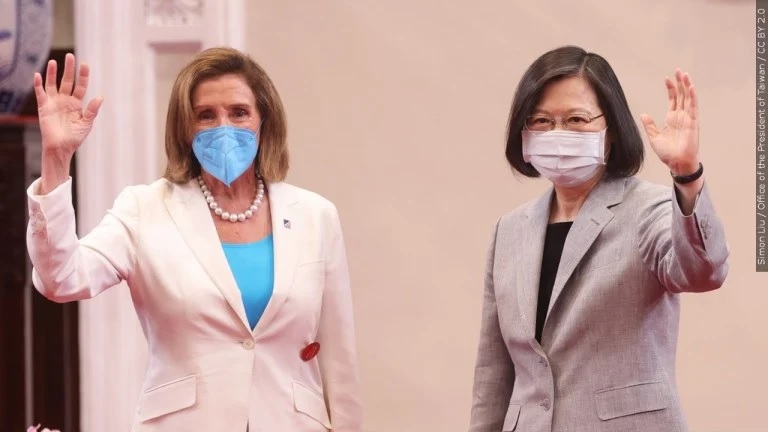TAIPEI, (Reuters) – China announced today it was halting dialogue with the United States in a number of areas, including between theatre-level military commanders and on climate talks, in an escalating furore over House Speaker Nancy Pelosi’s visit to Taiwan.
China’s foreign ministry said it was also suspending cooperation with Washington on prevention of cross-border crime and drug trafficking, an area along with climate change where U.S. officials see opportunity for cooperation.
Enraged after Pelosi became the highest-level visitor in 25 years to the self-governed island that Beijing regards as its sovereign territory, China launched military drills in the seas and skies around Taiwan on Thursday. The live-fire drills, the largest ever conducted by China in the Taiwan Strait, are scheduled to continue until noon on Sunday.
Taiwan’s defence ministry said on Friday a total of 68 Chinese military aircraft and 13 navy ships were conducting missions in the sensitive Taiwan Strait. Some of them, they said, crossed an unofficial buffer separating the two sides, a move the ministry described as “damaging the status quo”.
U.S. Secretary of State Antony Blinken said Washington has repeatedly made clear to Beijing it does not seek a crisis over Pelosi’s visit to Taiwan, which took place on Wednesday during a congressional tour of Asia.
“There is no justification for this extreme, disproportionate and escalatory military response,” Blinken told a news conference on the sidelines of the ASEAN Regional Forum in Cambodia. He added, “now, they’ve taken dangerous acts to a new level”.
On Friday, China’s military conducted air and sea drills to the north, southwest and east of Taiwan “to test the troops’ joint combat capabilities”, the Eastern Theater Command of the People’s Liberation Army (PLA) said in a statement.
Blinken emphasised that the United States would not take actions to provoke a crisis, but it would continue to support regional allies and conduct standard air and maritime transit through the Taiwan Strait.
“We will fly, sail and operate wherever international law allows,” he said.
DIPLOMATIC FRONT
The White House summoned Chinese ambassador Qin Gang on Thursday to condemn the escalating actions. That followed Beijing’s summoning of U.S. Ambassdor Nicholas Burns early this week over Pelosi’s Taiwan visit.
Representatives for the State Department did not immediately reply to a request for comment on China’s halting of talks and cooperation on several fronts.
The Chinese comments did not mention a suspension of military talks at the senior-most levels, such as with U.S. Defense Secretary Lloyd Austin and Chairman of the Joint Chiefs of Staff General Mark Milley. While those talks have been infrequent, officials have said they are important to have in the case of an emergency or accident.
Beijing separately announced that it would personally impose sanctions on Pelosi and her immediate family in response to her “vicious” and “provocative” actions.
“Despite China’s serious concerns and firm opposition, Pelosi insisted on visiting Taiwan, seriously interfering in China’s internal affairs, undermining China’s sovereignty and territorial integrity, trampling on the one-China policy, and threatening the peace and stability of the Taiwan Strait,” a Chinese foreign ministry spokesperson said in a statement.
Speaking in Japan, Pelosi said her trip to Asia was never about changing the regional status quo.
Taiwan’s defence ministry said the island’s military had dispatched aircraft and ships and deployed land-based missile systems to monitor ships and aircraft that briefly crossed the Taiwan Strait median line.
On Thursday, China fired multiple missiles into waters surrounding Taiwan.
Japan’s defence ministry, which is tracking the exercises, first reported that as many as four of the missiles flew over Taiwan’s capital, which is unprecedented. It also said that five of nine missiles fired toward its territory landed in its exclusive economic zone (EEZ), also a first, prompting a diplomatic protest by Tokyo.
Later, Taiwan’s defence ministry said the missiles were high in the atmosphere and constituted no threat. It gave no details of their flight paths, citing intelligence concerns.
Some Taipei residents, including Mayor Ko Wen-je, criticised the government for not putting out a missile alert, but one security expert said that could have been done to avoid stoking panic and playing into China’s hands.
“It counteracted the effect of the Chinese Communist Party’s psychological warfare,” said Mei Fu-shin, a U.S.-based analyst. “The shock and fear were not as great as they could have been.”
Asked to comment on the missiles, Taiwan Premier Su Tseng-chang did not directly respond, but referred to China as the “evil neighbour showing off her power at our door.”
“In my view, the larger threat is that China is doing a rehearsal for a blockade, demonstrating it can block Taiwan’s ports and airports, and prevent shipping,” said Bonnie Glaser, a Washington-based Asia security specialist at the German Marshall Fund of the United States.









